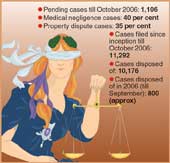 |
Ramendranath Mukherjee, a retired government pleader, had purchased a flat in an apartment block in the city. He was granted possession of the flat but faced problems during registration.
The owner of the plot, who had a tiff with the developer, refused to execute and register the “deed of conveyance” in favour of Mukherjee, prompting him to move the state consumer disputes redressal commission in 2000.
Six years have passed and Mukherjee is still waiting for the judgment. “The hearing is over, but the verdict has not been delivered,” said his lawyer.
S.K. Mukherjee had lodged a complaint in 2006, alleging that he had lost his sight following a cataract operation because of the surgeon’s negligence. The case is yet to be taken up for hearing.
The Mukherjees’ cases are not unique. Thousands of consumers who had lodged complaints directly with the state commission (original petition) or had appealed against the judgments of the district consumer courts (first appeal) years ago are still awaiting justice.
Sources in the government said more than 1,100 cases are pending with the commission. Most of these are related to medical negligence or property disputes. According to sources, almost 40 per cent of the cases pending are related to medical negligence.
“Lack of infrastructure, shortage of staff and absence of coordination between various departments are the main causes for the delay in passing orders,” said Prabir Basu, working president, Bengal Federation of Consumer Organisation.
“The commission is really plagued with a shortage of stenographers. Once a judgement is pronounced, it takes a lot of time to get the original copy because we do not have enough stenographers,” one of the judges at the state consumer court said.
The commission had earlier decided to take some “specific steps” to speed up the hearing and disposal of the pending cases. Two years ago, it had decided to share duties equally among the bench members and cut down on procedural delays.
Complainants and defendants were directed to file written arguments in brief, instead of making lengthy verbal submissions. Commission members, after studying the written statements, would ask some key questions to the contesting parties and arrive at a conclusion.
The efforts notwithstanding, the backlog continues.
Officials claimed that it takes longer to pronounce judgment in medical negligence cases.
“The procedural delays in these cases are causing the backlog,” said an official.
Statistics reveal that the rate of disposal has been slower this year, compared with that of 2004. While around 800 cases have been disposed of till now this year, nearly 950 cases were disposed of in 2004. In 2005, the figure was around 750.











